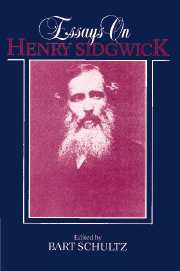Book contents
- Frontmatter
- Contents
- Foreword
- Acknowledgments
- List of contributors
- List of abbreviations
- Introduction: Henry Sidgwick today
- PART I Common-sense morality, deontology, utilitarianism
- 1 Sidgwick and nineteenth-century British ethical thought
- 2 Sidgwick and the Cambridge moralists
- 3 Sidgwick and Whewellian intuitionism: some enigmas
- 4 Common sense at the foundations
- PART II Egoism, dualism, identity
- PART III Hedonism, good, perfection
- PART IV History, politics, pragmatism
- Index
3 - Sidgwick and Whewellian intuitionism: some enigmas
Published online by Cambridge University Press: 05 June 2012
- Frontmatter
- Contents
- Foreword
- Acknowledgments
- List of contributors
- List of abbreviations
- Introduction: Henry Sidgwick today
- PART I Common-sense morality, deontology, utilitarianism
- 1 Sidgwick and nineteenth-century British ethical thought
- 2 Sidgwick and the Cambridge moralists
- 3 Sidgwick and Whewellian intuitionism: some enigmas
- 4 Common sense at the foundations
- PART II Egoism, dualism, identity
- PART III Hedonism, good, perfection
- PART IV History, politics, pragmatism
- Index
Summary
Sidgwick's Methods of Ethics appears to defend a revised utilitarianism against both egoism and intuitionism, while conceding that the practical results of enlightened egoism largely coincide with those of utilitarianism, and that the utilitarian greatest-happiness principle can be justified only as a fundamental intuition. It is true that Sidgwick was distressed by the description of his treatment of intuitional morality as “mere hostile criticism from the outside” and protested that that morality “is my own… as much as it is any man's; it is, as I say, the ‘Morality of Common Sense,’ which I only attempt to represent so far as I share it” (ME, x). However, he could not well have denied that, in The Methods of Ethics, the endorsement tentatively accorded to intuitional morality as a system is in the end withdrawn. Ultimately it is concluded that utilitarianism can define and correct what intuitional morality is vague or mistaken about, and can complete what common sense does not venture to treat at all. Hence the teaching of The Methods of Ethics appears to be that, at the final stage of moral thinking, utilitarianism replaces intuitional morality, even though it incorporates, on a new basis, many intuitional precepts.
Yet, closer reading of Sidgwick's ethical writings throws doubt both on whether he was consistent in reaching these conclusions and on whether he held them firmly.
- Type
- Chapter
- Information
- Essays on Henry Sidgwick , pp. 123 - 142Publisher: Cambridge University PressPrint publication year: 1992
- 9
- Cited by



